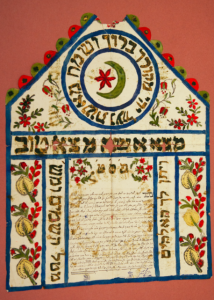
Ketubah of the Bensussan family in Tekirdag, Ottoman Empire, 1919. Shared with the Sephardic Studies Program by Rabbi Solomon Maimon and Albert Maimon.
A beautifully illustrated Jewish wedding contract, or ketubah, adorned with the symbols of Islam—the star and the crescent: this is one of the most striking artifacts that has surfaced as part of the Sephardic Studies Program’s effort to collect, digitize and make accessible the cultural and literacy heritage of Sephardic Jews. Shared with us by Rabbi Solomon Maimon and Albert Maimon, the ketubah dates from 1919 and pertains to the Bensussan family from the town of Tekirdağ, then in the Ottoman Empire (today’s Turkey). The ketubah made its way to Seattle nearly a century ago, transplanting a piece of Ottoman Jewish culture from the eastern Mediterranean to the Puget Sound and linking Jews and the Islamic world to the Pacific Northwest.
The ketubah compels us to reconsider the relationship between Judaism and Islam by reminding us that, although contemporary media may present it otherwise, Jews and Muslims were not always in conflict, but rather lived side by side, cooperating and collaborating for centuries in the realm of the Ottoman Empire. Indeed, Jewish chroniclers lauded the Ottoman Empire as a Jewish safe haven. In 1454, Isaac Sarfati emphasized the preference among Jews to live under Muslim rather than Christian rule: “Turkey is a land wherein nothing is lacking… Is it not better for you to live under Muslims than under Christians? Here every man may dwell at peace under his own vine and fig-tree.” After Jews expelled from Spain in 1492 found shelter in the Ottoman Empire, the image of Ottoman tolerance and protection was solidified. In 1550, Jews in Salonica declared: “Turkey is entirely open to you, settle here, our brethren, in the best of the land!
But “tolerance” in the Ottoman context was double edged, for it served as an alternative not only to the persecution and exclusion of the pre-modern Christian world, but also as an alternative to equal rights. Governed by Islamic law, the Ottoman Empire guaranteed a place in society for non-Muslims so long as they recognized their inferior status, paid special taxes, and pledged their allegiance to the sultan. In exchange, they gained the protection of the sultan and the privilege to build their own houses of worship, speak their own language, and develop their own institutions. They certainly were tolerated, but they were not equals. The authoritative Ladino (Judeo-Spanish) dictionary fittingly defines toleransya as “indulgence of what we do not like.”
With the rise of modern notions of citizenship and equal rights in the nineteenth century, the old order of the Ottoman Empire, however peaceful it may have been, was overturned by yearnings for equal political and civil status for all. Nationalist leaders went further by arguing that each nation ought to govern itself rather than be subject to the rule of others. Mere tolerance was not enough: equal rights or national independence became the new calls of modernity that led to the overthrow of Europe’s land empires, the Hapsburgs, Romanovs, and Ottomans. But Jews did not immediately embrace the call of national liberation; some sought to integrate into their surroundings and many met the idea of the nation-state with trepidation. This was true in the Ottoman Empire, where Jews clung to an image of their empire as a bastion of tolerance.
Our collection’s ketubah with the Islamic star and crescent emerged out of this milieu, on the cusp of the transition from the Ottoman Empire to modern Turkey (est. 1923). The inclusion of these symbols constituted a traditional expression of gratitude to the empire for the protection and tolerance offered by Islam; the symbols further represented modern expressions of patriotism and political belonging. They also constituted an expression of self-defense, an anxiety that if Jews did not publicly pledge their allegiance to the Ottoman Empire, the protection and tolerance from which they benefited could be revoked. They were aware of the fate of fellow non-Muslims who rebelled or who clamored forcefully for equal rights or political independence. Indeed, as punishment for these demands, Armenians suffered genocide at the hands of the purportedly tolerant Ottoman Empire in the midst of World War I.
The ketubah reminds us that the tensions that seem to be so entrenched between Jews and Muslims in the Middle East are really the modern products of major political and cultural changes that transpired over the past century. Made possible by the Ottoman Empire’s policy of tolerance, peaceful coexistence—rather than conflict—was the norm for the previous five centuries. But the ambiguous moral and political resonances of the concept of tolerance remain with us today. Turkey still points to its “tolerance” of Jews as a way to divert attention away from the shame of the Armenian genocide and mistreatment of other minorities. And political forces around the world continue to appeal to the notion of tolerance as a way to ensure peace, stability, and civility, but to do so at the expense of desires for human dignity, universal rights, equal treatment before the law, and an embrace—not mere tolerance—of differences with regard to religion, nationality, race, language, culture, class, gender, and sexual orientation. Even if tolerance may provide the prospect of peace under one’s own proverbial vine and fig tree, is it enough merely to indulge in what we do not like?
Editor’s note: A shorter version of this article appeared in the “Tolerance Roundtable” section of the Stroum Center’s Jewish Studies Impact Report, Fall 2016. View the entire report here.
Links for Further Exploration
- “The Limits of Tolerance” – Roundtable Introduction by Noam Pianko (Nov. 2016)
- “An Ottoman Jew in Paris” by Christina Stajnkrycer (May 2015)
- “A Soldier’s Ladino Poems of Ottoman-Jewish Pride” by Hannah Pressman (Nov. 2014)

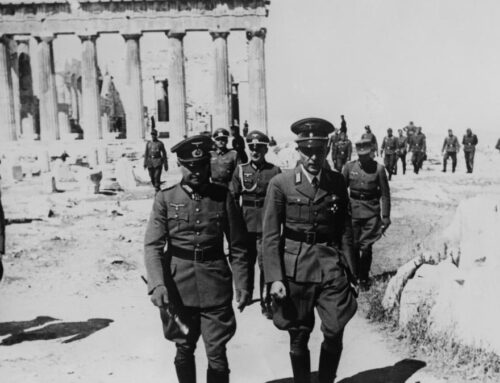

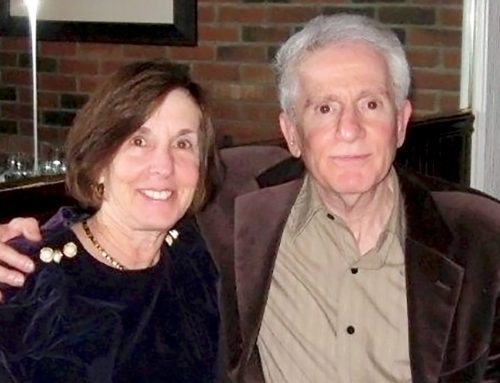
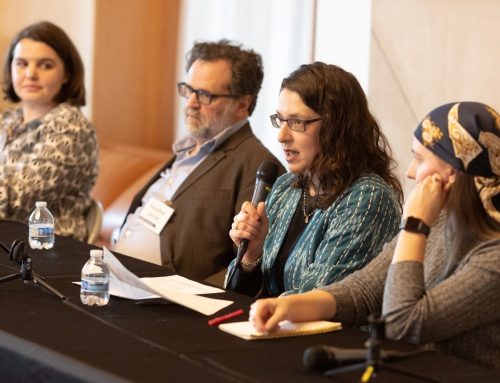
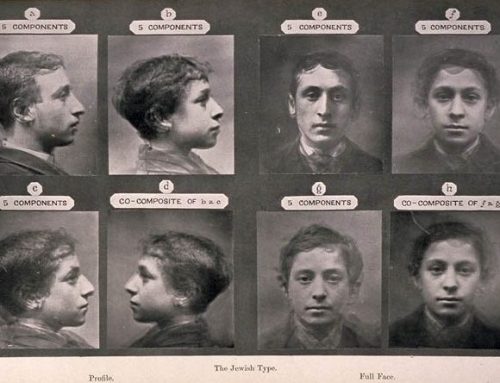
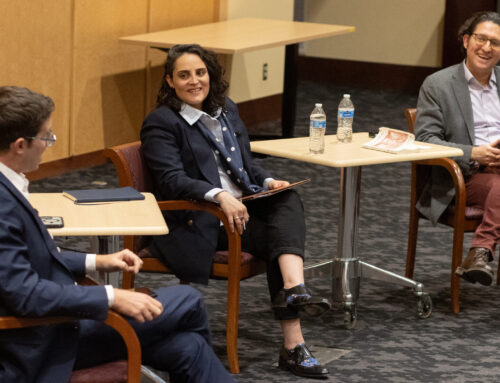
My Grandfather was born 1869 in Salonica, Isak Yeni ,was connected to families Burla and Abravanel. Married an Italian Jew, Pia Della Torre Both were exterminated Feb.8th 1944.Sure wish I knew more about the Yeni family. Maurice Abravaenel the well known conductor of the Utah Symphony was a relative of my grandfather’s a descendant of Don Issac De Abravanel of Spain.
At the same time praising and disparaging the Ottomans. The Ottomans allowed Jews and other minority groups security. They were free to make a living, worship and keep their ancestral languages. What else does anyone want? No thankfulness for centuries of peace and prosperity.